Skip ahead
The only way you can have a profitable e-commerce website is if you have customers. However, every business owner knows that it can be hard to attract buyers. While many people would suggest online advertising as a way to get new business, this can be very expensive. An important component of your marketing strategy needs to be search engine optimization. By focusing on SEO for e-commerce, you can get free, organic traffic from people who are looking for what you have to offer.
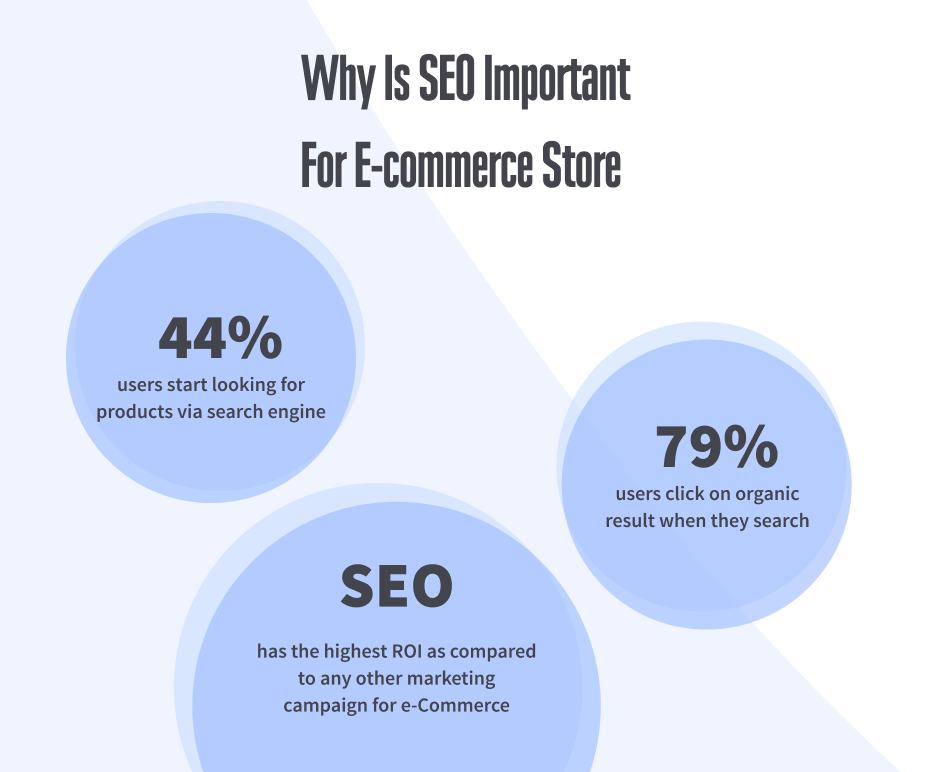
Even though SEO offers a high return on investment, many online sellers ignore it or think it’s only about adding a few keywords here and there. In the meantime, they post heavily on social media or throw thousands of dollars into ads. While social media and advertising are also important, the return on investment is often much lower. In this article, we’ll share some e-commerce SEO tips and show you how to optimize an e-commerce website for SEO.
Start With Keyword Research
Keyword research needs to be the first step in any SEO campaign. You need to come up with a list of keywords that people are likely to search for when they have a problem that your products can solve. While it may seem like you can just come up with keywords on your own, you need to do your research. There are lots of synonyms and combinations of words that people will use. Some will be highly specific long-string keywords while others may be more generic.
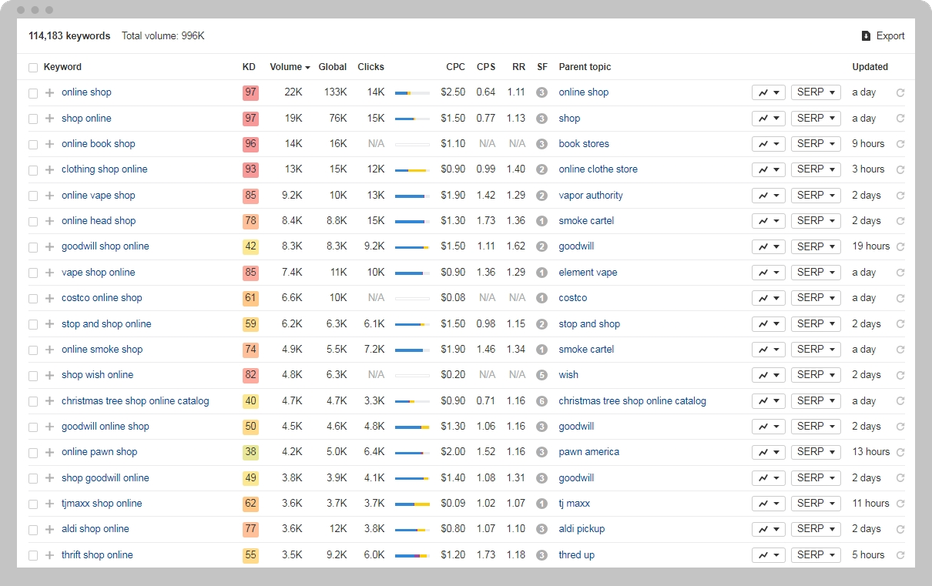
When working on SEO for e-commerce store promotion, you need to target keywords that have a good search volume and are relatively easy to rank for. Since you want visitors to your site to make purchases, you also need keywords that will lead to conversions.
To find the most effective keywords, you need to focus on:
- Popularity: Naturally, you want to use keywords that lots of people search for. You can research this using tools like SEMRush or Ahrefs keyword explorer.
- Relevance: Both people and search engines want searches to match users’ intent. Your keywords should not be too specific or too broad. Let’s say you sell sewing machines but you target search terms like “women’s clothing” or “fabric stores”. You would be misleading visitors to your site and your bounce rate is likely to be high.
- Competition: Other online sellers in your niche will be targeting similar keywords. It can be hard to rank for the most popular keywords in certain industries. If there are huge players in the market, they are likely to dominate the first page. To increase your chances of reaching your target audience, aim for keywords with a high search volume and low competition. You may not be able to compete for “shoe store” but you may do well with “women’s shoes in Philadelphia”.
Have An Optimal Site Structure
Once you’ve identified the best keyword, you need to make sure you have the best e-commerce website structure for SEO. The structure of your site refers to how you set up category pages, product pages, and site navigation. Essentially, you want to make it as easy as possible for shoppers to find what they need.
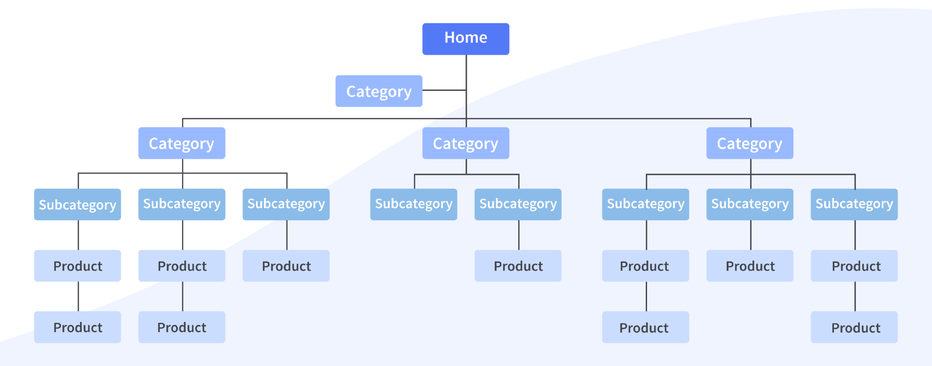
An optimal site structure is simple with no page being more than three clicks away from another. Your keyword research can be used to help you craft your URLs and categories. Your site’s home page should have links to all the major categories and possibly some of your most popular product pages. SEO for e-commerce product pages is also important. By implementing proper navigation as well as solid internal linking, your pages will be more likely to rank highly.
Focus on Technical SEO
Often, an e-commerce SEO audit reveals that a site has technical issues that prevent it from ranking on the first page of Google. Technical SEO refers to things you do in the backend to improve your search engine rankings. Let’s look at some of the areas that have to be addressed.
HTML and XML Sitemaps
There are two types of sitemaps that require your attention. XML sitemaps invite search engines to crawl a URL. They help to ensure that search bots can properly index all the necessary pages on your site. While having an XML sitemap doesn’t automatically mean that a particular page will be indexed, it increases the chances significantly. On the other hand, HTML sitemaps help people to navigate your website via internal linking. They provide additional ways for users to reach even the deepest pages. While these don’t have a big impact on searchability, it doesn't hurt to improve them.
Robots.txt
There are certain pages on your e-commerce site that you won’t want search engines to crawl such as log-in pages, shopping carts, and checkout pages. To block these pages from Google, you can use Robots.txt files. Robots.txt is not as popular as it used to be since Google can usually determine which pages it needs to crawl and index. However, shopping sites tend to have more pages that should be excluded so these files can be useful. During your e-commerce SEO audit, check to see if there are any pages that you need to block.
Canonical Tags
You also have to use canonical tags, especially if your site is large. You may have product pages that users can reach from multiple categories. This means you’ll have multiple URLs leading to the same content. A canonical tag is a bit of HTML that tells Google and other search engines which version of the URL you want to show up in the search results. You should also use a canonical tag on your homepage since e-commerce sites tend to have homepage duplicates.
Embrace Content Marketing
Your SEO strategy for e-commerce also needs to include a focus on content. Instead of just pushing product after product, you need to inspire, entertain, and inform your current and potential customers. One of the simplest ways to do this is by having a blog. Here, you can write valuable, relevant content incorporating the keywords you identified early on. Long-tail keywords are especially useful. You can use SEMRush’s Topic Research feature to help you come up with ideas that have lots of potential for search engine optimization.
If people are googling a topic, it’s safe to say they want to know more about it. Informing them could lead to a sale. That’s why how-to content is so popular. These types of posts are likely to be shared and linked, giving you additional SEO traction.
Create and Share Video Content
Video content is usually well-received online so you shouldn’t shy away from this type of content. Whether you do fun TikTok videos, product demos, explainer videos, or conversational interviews will depend on your brand and the type of products you sell.. Consumers enjoy video content so as long as you create content in keeping with their needs, you’re likely to get a boost in SEO.
Use Social Media Well
Social media should be part of your SEO strategy for e-commerce. When you publish your content, share it on your social media pages and make it easy for others to share directly from your website. This is likely to improve your site’s search engine rankings. A strong social media presence along with likes, shares, and comments helps to build site authority and brand awareness.

Pursue Link Building
If you create high-quality content, other websites will link to it. These backlinks are important since Google uses them as ranking factors. However, not all links are created equally. You want links from authoritative, reputable websites. Use the SEMrush Backlink Gap tool or Ahrefs Link Intersect to identify the domains that link to your competitors’ websites but not yours. Not all of these domains may be appropriate for you, but you should try to build relationships with those that are.
You can also seek out backlinks from the suppliers of the products you sell or the manufacturers of the inputs. These companies are usually eager to let others see how their products are used so they may be willing to add you to a list or directory.
Another way to build links is to guest post on other people’s blogs and have a link to your site appear in the article or in your bio at the end. Just make sure that the site you’re writing for is relevant to your business. If it is, this can be a good way to get fresh eyes on your content and products.
Don’t Neglect Local SEO
Local SEO for e-commerce can play a big role in your ability to attract your target audience. If you have a brick-and-mortar store or you only do business with people in certain locations, you want to target people who are nearby. Local SEO helps you to stand out from our businesses in your area that are offering similar products.
So how do you get started with this type of marketing? First, you need to have a Google My Business Page that’s properly filled out. Otherwise, you could be missing out on lots of visibility when people look for businesses just like yours. Google My Business also allows you to provide lots of information to people who are searching directly for your business. You can put your location, opening hours, website, and other important information at an individual's fingertips. People can also get directions to your business, find out when it’s busiest, and see customer reviews.
Google isn’t the only option. Yahoo Local and Bing Places offer similar features and it’s a good idea to optimize these listings as well. Yelp, Yellow Pages, and niche, local directories are also valuable when improving your local SEO for e-commerce.
Increase Leads and Conversions by Boosting Your SEO Strategy
You now have some tips on how to improve e-commerce for SEO. If you want to generate more sales online, there are only so many things you can do. The most successful online sellers use a combination of email marketing, paid advertising, social media marketing, and search engine optimization. The latter is an absolute must since individuals turn to Google or another search engine whenever they want to make a purchase. If your site doesn't turn up on the first page of the search engine results, potential customers may never know you exist.
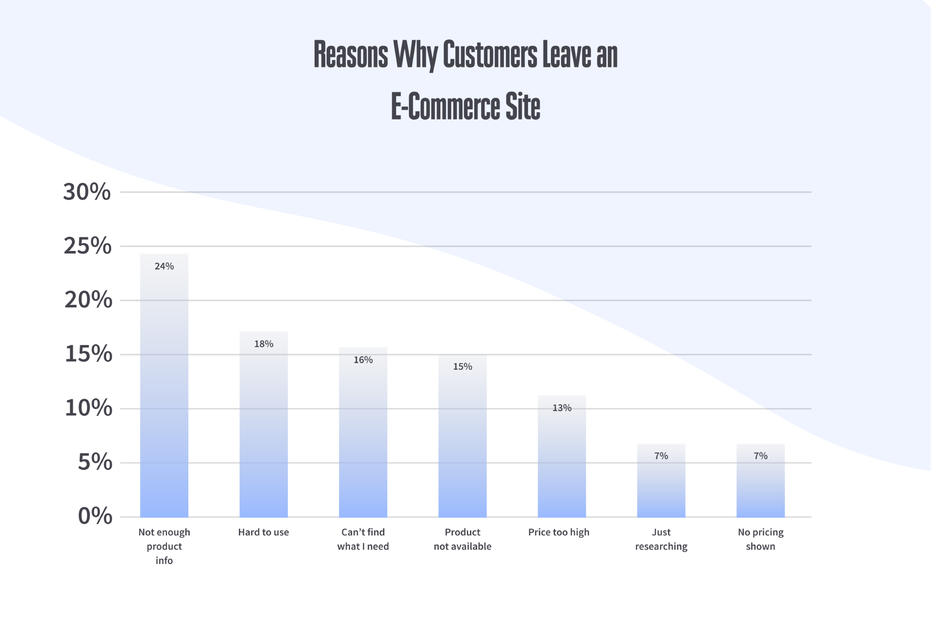
An SEO campaign doesn't have to be complicated to generate thousands of visits and hundreds of sales. It just needs to be well-planned and well-targeted. Done correctly, it won’t take years for you to see improvement in your leads and conversions. When you follow the steps we’ve outlined here, you’ll be better able to outrank your competitors.
If you don’t have the time or resources to devise an SEO strategy, you can focus on your core business and hire an SEO agency to take care of it for you. At Direct Line Development, we have a team of experts who can audit your existing site, make recommendations on how you can improve, and even implement the changes if that’s what you need. Get in touch with us today to take your business to the next level!






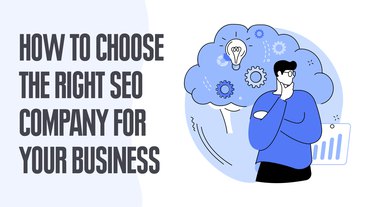
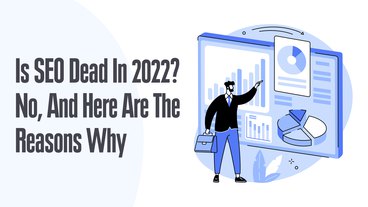
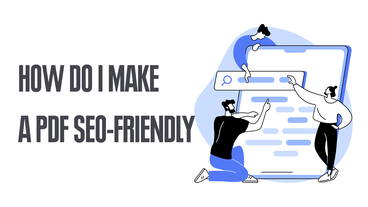

Comments